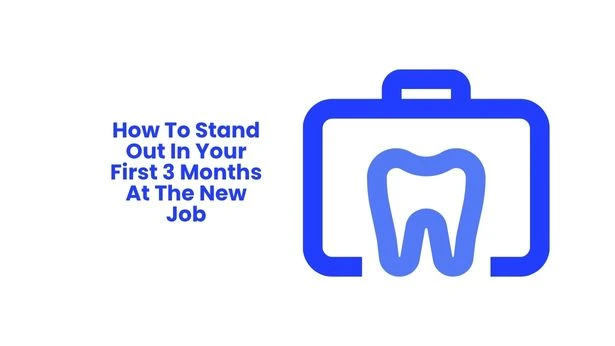First 90 Days in a New Dental Job: What to Expect
Starting a new dental job can be thrilling and full of learning opportunities. Whether you’ve just graduated from dental school or are making a clinic switch, the first few months set the tone for your professional life. The first 90 days as a dentist are spent adjusting to the workplace culture, learning expectations, establishing trust among patients and coworkers, and honing your clinical assurance.Let’s consider what the first three months of your new job might be like and how to maximize this critical period.

Meet your new colleagues, including dentists, hygienists, assistants, and front-desk staff.
Learn about practice policies, processes, and procedures related to patient care.
Shadow seasoned colleagues to see the patient workflow.
Be trained in your dental software and documentation, as well as the equipment used.
One of the early focuses should be to identify what to expect in your first Dental Position; every practice is different in how they operate, from treatment planning to billing processes. Understanding these differences from the beginning will help you ease into the transition of being a new dentist. This is also a great time to receive tips on onboarding as a new dentist, such as:
Ask questions — better to verify than assume.
Take copious notes about processes and preferences.
Observe how other dentists communicate effectively with staff and patients.
2. Weeks 5–8: Confidence Development: By month two, you should start to feel more competent doing procedures without the assistance of a supervisor. This can be a pretty thrilling yet terrifying time. Don’t panic, it’s completely normal to feel a little overwhelmed.
At this stage, you should be:
Practicing your diagnosis and technical chairside skills.
Preferred communication styles among staff.
Learning how to effectively manage time between patients and documentation.
In addition to this transition, you are also getting used to a new workplace and there will still be unwritten norms to consider, including:
How staff provide feedback.
How staff prefer to communicate.
How staff manage emergencies or other surprises.
Be proactive and discuss your initiation to practice with your supervisor or mentor. Most practices will appreciate a 10-minute feedback check-in. It exhibits maturity to reflect on your progression and willingness to grow.
3. Weeks 9–12: Settling into a Rhythm: By now, you’ve probably settled down and become a member of the team. You’re more clinically proficient and familiar with members of the practice, their personalities, and way of doing things.
During the last three weeks of your first three months, try to:
Take responsibility for your patient caseload and treatment plans.
Suggest changes to patient care/outcomes or workflows (when appropriate).
Continue to establish a strong rapport with dental assistants and front desk staff.
This will be a good time to reflect on your personal and professional objectives. Are you learning as much as you hoped? Do you feel supported? It’s worth re-evaluating your adjustment to the new dental workplace and noting areas and opportunities for improvement.
Ultimately, the first 90 days of your career life as a dentist will involve not only proving to others you are competent, but also ascertaining if this environment ultimately supports your success.
Common Challenges in the First 90 Days

Let’s be real – not everything will be perfect. You will still have some speed bumps along the way, including:
Miscommunication with your co-workers or patients.
Managing your time.
Second-guessing your clinical judgement.
Dealing with varying degrees of standards/expectations.
Use these events to allow you to grow, and not be disheartened by them. You are still learning and starting your new job in another dental clinic; nobody should expect perfection on Day one.
Also Read: Top Locations For New Dental Graduates
Professional Tips for New Dentists
A few pro tips for new dentists onboarding to ensure your transition is successful:
Be friendly: Colleagues and patients will only support you more if you are.
Change your perspective on feedback: Remember, it is not criticism; it is the oil that fuels growth.
Organize yourself: Use a checklist for daily or even weekly items.
Don’t isolate yourself: Use dental associations, forums, or study groups to network.
Final Call Over Your Foundation for Success
The first 90 days as a dentist are about development, adaptation, and putting the mechanisms in place for ongoing success. Everything you learn, every adjustment you make, and every way you adapt will affect how competent and confident you feel and act in moving forward.
Practice patience with yourself, stay open to feedback, and take action. Don’t forget that this is your journey, and you are improving every day.
Starting your dental career? Avoid common pitfalls and set yourself up for success by understanding what not to do in your first role. Discover every dental job opportunity that aligns with your strengths and career goals. Contact Hire Smiles today to get expert guidance and land the right dental position with confidence.
FAQs on The First 90 Days in a New Dental Job
Q1. What am I supposed to prioritize during my first 90 days as a dentist?
Things need to be prioritized, such as strong relationships, understanding clinic procedures, and providing consistent patient care.
Q2. How do I prepare prior to commencing a new dental position?
Review clinical competence, become familiar with the workflow in the office, and define expectations with your employer.
Q3. Is it inevitable to feel overwhelmed as a new dental practitioner?
Yes, it’s normal. You’ll become more confident and comfortable with time, training, and guidance.
Q4. How do I settle into a new dental workplace culture?
In order to settle into a new dental workspace culture, look out for team dynamics, be respectful in your communication, and be receptive to feedback.
Q5. What if I mess up in my first days?
All you need to do is relax, own it professionally, learn from it, and use it as an opportunity to enhance your practice.
Q6. How critical is patient communication in a new role?
Yes. Honest, caring communication establishes trust and calms patient fears.
Q7. Should I ask questions during the onboarding process?
Yes. Asking questions demonstrates initiative and prevents expensive mistakes.
Q8. How do I monitor progress in my first 90 days?
Create personal objectives, solicit feedback regularly, and assess your development weekly.
Related Article: Top 5 Mistakes to Avoid in Your First Dental Job





